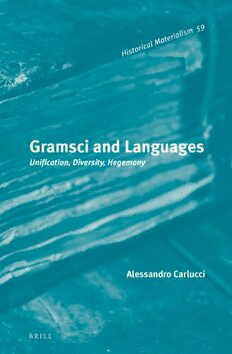Table Of ContentGramsci and Languages
Historical
Materialism
Book Series
Editorial Board
Sébastien Budgen, Paris – Steve Edwards, London
Marcel van der Linden, Amsterdam – Peter Thomas, London
VOLUME 59
The titles published in this series are listed at brill.com/hm
Gramsci and Languages
Unification, Diversity, Hegemony
By
Alessandro Carlucci
LEiDEn • BOSTOn
2013
Library of Congress Cataloging-in-Publication Data
Carlucci, Alessandro.
Gramsci and languages : unification, diversity, hegemony / By Alessandro Carlucci.
pages cm. — (Historical Materialism Book Series ; Volume 59)
includes index.
iSBn 978-90-04-23111-5 (hardback : alk. paper) — iSBn 978-90-04-25639-2 (e-book) 1. Gramsci, Antonio,
1891–1937—Knowledge—Linguistics. 2. Gramsci, Antonio, 1891–1937—Criticism and interpretation.
3. Language and languages—Political aspects. 4. Linguistics—Philosophy. 5. Critical theory.
6. Sociolinguistics. i. Title.
P85.G72C27 2013
410.92—dc23
2013025137
This publication has been typeset in the multilingual “Brill” typeface. With over 5,100 characters
covering Latin, iPA, Greek, and Cyrillic, this typeface is especially suitable for use in the
humanities. For more information, please see www.brill.com/brill-typeface.
iSSn 1570-1522
iSBn 978-90-04-23111-5 (hardback)
iSBn 978-90-04-25639-2 (e-book)
Copyright 2013 by Koninklijke Brill nV, Leiden, The netherlands.
Koninklijke Brill nV incorporates the imprints Brill, Global Oriental, Hotei Publishing,
iDC Publishers and Martinus nijhoff Publishers.
All rights reserved. no part of this publication may be reproduced, translated, stored in
a retrieval system, or transmitted in any form or by any means, electronic, mechanical,
photocopying, recording or otherwise, without prior written permission from the publisher.
Authorization to photocopy items for internal or personal use is granted by Koninklijke Brill nV
provided that the appropriate fees are paid directly to The Copyright Clearance Center,
222 Rosewood Drive, Suite 910, Danvers, MA 01923, USA.
Fees are subject to change.
This book is printed on acid-free paper.
Alla mia famiglia: operai e contadini.
Contents
Preface ............................................................................................................................ xi
introduction ................................................................................................................. 1
Linguistic reflections as an integral part of Gramsci’s legacy .................. 1
Modern linguistics and the philosophy of praxis ........................................ 5
Towards a better understanding of Gramsci’s views .................................. 7
1. The limited number of writings usually considered ...................... 7
2. The risks involved in neglecting Gramsci’s biography .................. 8
3. identifying sources and cultural links: a productive trend in
recent research .......................................................................................... 11
4. Linguistic themes and the debates on Gramsci’s Leninism ........ 12
Diversity and unification: a few considerations in conclusion ............... 15
1. Experiencing Linguistic Diversity and Cultural Unification ..................... 19
1.1. Sardinian in Gramsci’s life .......................................................................... 19
1.2. Gramsci’s correspondence .......................................................................... 22
1.3. The Sardinian years ....................................................................................... 30
1.4. Turin .................................................................................................................. 34
1.5. The Sassari Brigade in Turin, April–July 1919 ........................................ 38
1.5.1. The arrival of the Brigade ................................................................ 38
1.5.2. The editorial board of L’Ordine Nuovo ......................................... 41
1.5.3. The successful campaign among Sardinian soldiers ............... 44
1.6. From Turin to the prison years ................................................................. 50
1.7. Gramsci’s views on national linguistic unification ............................. 58
1.7.1. ‘Every individual . . . is a philosopher’ ........................................... 58
1.7.2. The shortcomings of monolingualism ......................................... 61
1.7.3. Final remarks ....................................................................................... 65
2. influences and Differences: The Formation of Gramsci’s Views ............. 67
2.1. Gramsci’s direct and indirect sources in language studies ............... 67
2.2. Echoes of Saussure’s ideas .......................................................................... 70
2.2.1. Grammar ............................................................................................... 70
2.2.2. Metaphors ............................................................................................. 72
viii • Contents
2.2.3. Language planning ............................................................................ 78
2.2.4. The penetration of Saussurean concepts into italian
intellectual culture ............................................................................ 80
2.2.5. A possible channel of transmission: the Cours in Russia,
1917–25 .................................................................................................. 83
2.2.6. Final remarks ...................................................................................... 88
2.3. Language and social classes ....................................................................... 89
2.3.1. Sociological linguistics and the Marxist critique of
language .................................................................................................. 89
2.3.2. Bukharin .................................................................................................. 93
2.3.3. Sociolinguistic variation and the national question in
the USSR ............................................................................................... 98
2.3.4. Grammar and language education for the popular
masses ................................................................................................... 103
2.3.5. Final remarks ...................................................................................... 111
2.4. Glottopolitical aspects of Lenin’s influence .......................................... 112
2.4.1. Early Marxist approaches to language policies:
Marx and Engels ................................................................................ 112
2.4.2. The Second international ............................................................... 114
2.4.3. Lenin ...................................................................................................... 116
2.4.4. Did Gramsci know Lenin’s ideas on language? ....................... 122
2.4.5. Affinities ............................................................................................... 124
2.4.6. Jewish autonomy: a case of partial divergence ........................ 126
2.4.7. Final remarks ...................................................................................... 128
2.5. Rationalising and unifying linguistic communication ....................... 129
2.5.1. Soviet Esperantism ............................................................................ 129
2.5.2. Proletarian culture ............................................................................ 132
2.5.3. Sources and periodisation .............................................................. 136
2.5.4. Continuity and consistency of Gramsci’s glottopolitical
views ...................................................................................................... 138
2.5.5. Final remarks: Soviet inputs and the development of
Gramsci’s views .................................................................................. 145
3. Political implications ............................................................................................ 147
3.1. Gramsci and the linguistics of his time .................................................. 150
3.2. Language and politics in Gramsci’s writings ......................................... 156
3.3. The role of linguistic themes in shaping Gramsci’s politics ............. 161
3.3.1. necessary conditions ........................................................................ 166
3.3.2. Centres of irradiation ....................................................................... 167
3.3.3. The Jacobins ........................................................................................ 170
3.3.4. Language and hegemony ................................................................ 173
Contents • ix
3.4. Gramsci’s specificity ...................................................................................... 176
3.4.1. A man ‘in flesh and blood’ .............................................................. 176
3.4.2. Gramsci’s Marxism ............................................................................. 180
3.4.3. Final remarks ....................................................................................... 182
Conclusions: Gramscian Links between Language and Politics .................. 185
Gramsci in linguistics . . . ..................................................................................... 185
. . . and linguistics in Gramsci ............................................................................. 192
Appendix: Gramsci’s Legacy, 1937–2007 .............................................................. 201
4.1. The reception of Gramsci’s writings: the letters .................................. 202
4.2. Lost, unpublished and recently published material ........................... 204
4.2.1. Matteo Bartoli’s glottology course of 1912–13 ............................. 204
4.2.2. Gramsci’s translation of Finck’s work .......................................... 206
4.2.3. Gramsci’s comments on Panzini’s italian grammar ................ 206
4.2.4. Early work on Manzoni .................................................................... 207
4.3. Pre-prison writings and prison notes ...................................................... 208
4.4. Gramsci’s writings on language ................................................................. 213
4.5. Gramsci and linguistic disciplines ............................................................ 216
4.5.1. Early research ...................................................................................... 216
4.5.2. Exploring Gramsci’s ideas on language ....................................... 218
4.5.3. Using Gramsci’s ideas on language ............................................... 221
4.5.4. Gramsci’s influence and its limits: some examples ................. 225
4.5.5. Final remarks ....................................................................................... 228
References ..................................................................................................................... 231
index of names ............................................................................................................ 249
index of Subjects ......................................................................................................... 255

